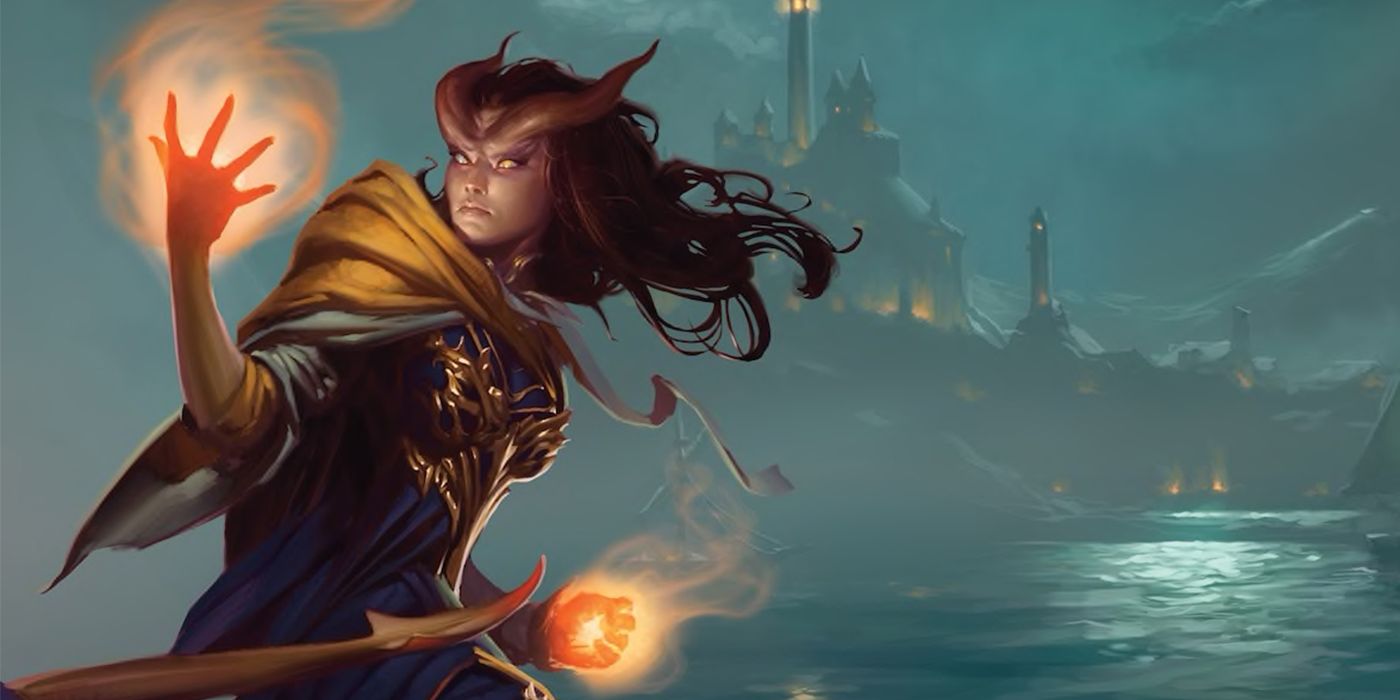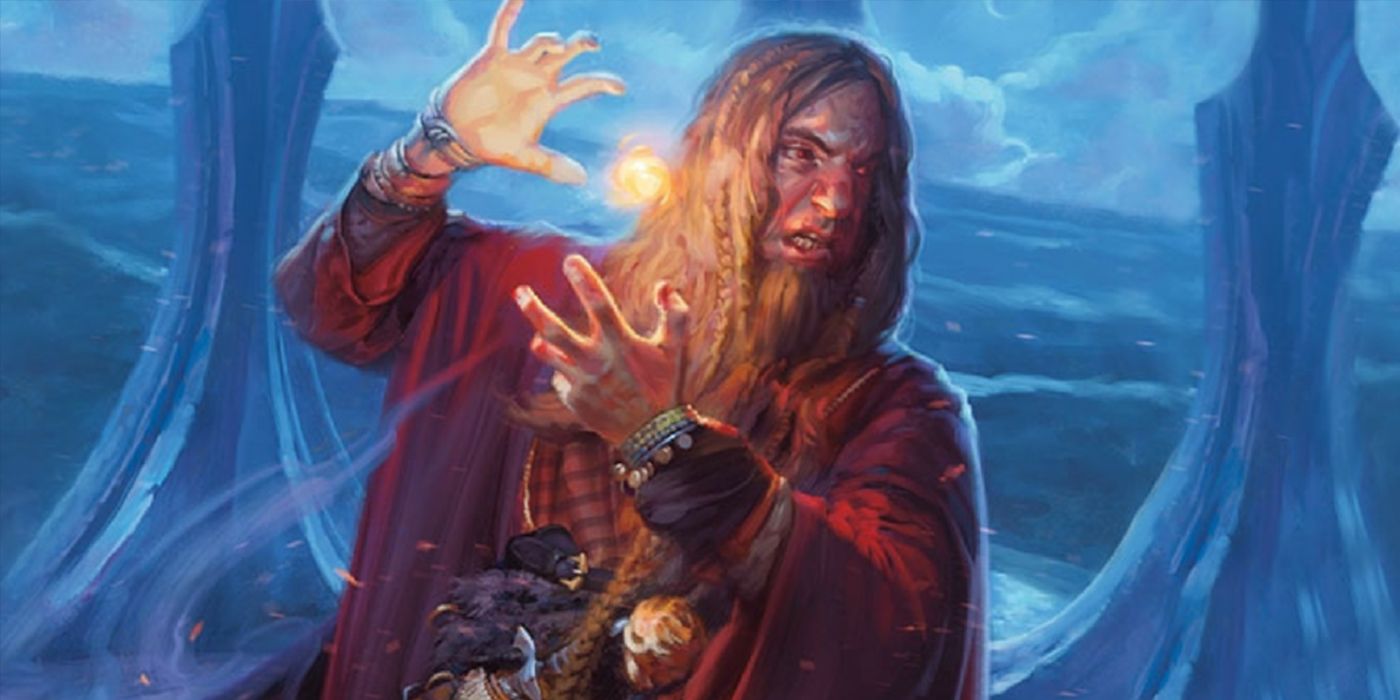Sorcerers make for an interesting type of arcane spellcaster in the world of Dungeons & Dragons; they don't spend years studying magical theory, nor do they make deals with mysterious entities—sorcerers just are. Descended from a powerful bloodline, sorcerers are born with the innate ability to manipulate the forces of the arcane, even bending the rules of D&D with certain spells...and given all the different ways their magic can manifest, sorcerous bloodlines also provide great roleplaying opportunities.
In D&D 5e, some players believe that sorcerers are the underpowered option compared to wizards, mainly due to the sorcerers' restricted spell list. However, the perks of playing a sorcerer shouldn't be discounted either, particularly when it comes to metamagic and sorcery points, as well as a couple of especially powerful sorcerous origins. So, when it comes to building a sorcerer, here are the routes players can take in character creation that will net them an unrivaled arcane caster on the field of battle.
Choosing a Race
The first choice players will be presented with when making a new character is to decide that character's race. In theory, any race would work, but only a select few of them come with benefits that lend to a sorcerer's power and ability. At the top of that list is the half-elf; with a +2 charisma bonus, +1 to two other abilities of choice, free skills, and resistance to being charmed, half-elves really do have it all as far as prerequisites for building a powerful sorcerer go.
Another great choice would be the tiefling, which also nets a +2 charisma bonus, plus resistance to fire damage and a selection of free spells such as Thaumaturgy, Hellish Rebuke, and Darkness. Lightfoot halflings also have the perfect stat bonuses for a sorcerer and some great racial abilities—they're the luckiest of the D&D races. Aasimar are pretty much the same as Tieflings, just their polar opposite in terms of heritage; Aasimar characters also get the charisma bonus, resistances, a bonus to healing, and some extremely useful racial abilities when it comes to dealing damage.
Players looking for a less commonly-picked racial option could try out a Triton or a Yuan-Ti Pureblood for the D&D campaign. Both get a good charisma bonus and extra spells, and the Yuan-Ti Pureblood also gets poison immunity and magic resistance—making both races very compatible with the sorcery skillset. Dragonborn get a strength bonus that really doesn't benefit the sorcerer at all, but they do get a +1 to charisma and resistance to one damage type, which makes them a decent choice, too.
Sorcerer Ability Scores
Different spellcasting classes derive their powers from different sources, and because the sorcerer's powers come from within, they utilize those powers not through intelligence or wisdom, but through sheer force of character. The sorcerer's spellcasting ability is based on their charisma, so naturally, charisma is the number one priority when it comes to stats. Assign the highest value to charisma, and work that score up to a full 20 as soon as possible to make sure the sorcerer is at their best.
After that, another stat that the sorcerer should have plenty of is dexterity. That might sound odd for a sorcerer, but dexterity in the 5th edition affects saving throws, armor class, initiative, and many other skills—and sorcerers, one of the few classes that start out unable to wear armor, will need as high a natural AC as they can get. Constitution is the other moderately important stat for sorcerers, both for getting more hit points (as sorcerers naturally don't have many compared to other classes) and for making concentration saves, which sorcerers will presumably have to do regularly.
Wisdom and intelligence rank lower in importance than dexterity and constitution, but they do offer some useful perks if they don't become a dump stat, so it's worth players deciding which of these two stats gets a higher score based on the type of character they want. Wisdom saving throws are such a common thing that it always ends up paying off to have a decent wisdom score. Intelligence, meanwhile, most definitely isn't a stat that sorcerers need (and a low-intelligence sorcerer could be fun to roleplay), but a good intelligence score lends itself to the Arcana skill, which some players might want.
Then there's the definitive dump stat for sorcerers: strength. Players' worst ability roll should absolutely be assigned to strength because there's really no valuable sorcerer abilities that use it. Sorcerers can create a maelstrom of fire with their minds; under no circumstances do they ever need to pick up an actual weapon!
The Best Subclasses
Sorcerous origins must be selected as the character is being created, and players have a wide range of options: there are the Draconic Bloodline, Storm Sorcery, Divine Soul, Shadow Magic, and Wild Magic subclasses (keep in mind that some of these aren't included in the starting Player's Handbook). Shadow Magic is quite powerful and versatile, and Wild Magic will certainly keep things fun on the battlefield, but for those in pursuit of the absolute best sorcerer build, the Divine Soul sorcerer is the way to go.
Divine Souls stand out in that they get a whole extra class's spell list added to their own, more or less eliminating that "restricted spell list" concern from above and making it the most versatile and potent subclass. Because they're descended from a divine being, such as a celestial or even a god, Divine Souls can pick spells from both the sorcerer's spell list and the cleric's—clerics have some pretty amazing spells, and as a sorcerer, players can lean into some interesting roleplaying options without needing to have a particularly religious character. Divine Souls also get the Favored By the Gods feat, which is the sorcerer's version of luck, and eventually a nice pair of otherworldly wings to bust out in a tight spot.
But if some people just aren't feeling a Divine Soul, the classic Draconic Bloodline subclass is a good one for players who like to focus on dealing damage with their spells. Between the Draconic sorcerer's Elemental Affinity and Metamagic, none but an Evocation-focused wizard can come close to matching their devastating amounts of damage when using spells that correspond to the sorcerer's chosen element. Plus, Draconic sorcerers also get wings, albeit dragon-like ones, so players will still get to swoop around out of enemies' reach.
Metamagic
There's one ability that only a sorcerer can boast, and it's metamagic. Sorcerers can spontaneously shape their spells right in the heat of battle, morphing them to better suit the situation at hand. Every use of metamagic costs sorcery points, which sorcerers continuously gain as they level up. Metamagic also takes many forms, but Twinned Spell, Quickened Spell, and Heightened Spell are all invaluable.
Twinned Spell can get expensive in terms of sorcery points, but it's worth it: a sorcerer who twins their spells can cast a damage-dealing spell at two opponents instead of one, or affect two creatures with a single-target spell that requires concentration, like Haste. It's casting two spells for the price of one. Quickened Spell gives a sorcerer more options for their bonus option by allowing a player to cast a regular spell and a cantrip in one turn; this metamagic effectively breaks the action economy and lets a sorcerer do more per their turn. Then, Heightened Spell can force disadvantage on the target's first saving throw against a spell, making D&D enemies that much more likely to succumb to a wicked Polymorph tossed their way.
Complimentary Feats
Every so often players will have the option to select a new feat for their sorcerer; as such, there are a few feats that should be considered first. The Inspiring Leader feat is great for building up that charisma score, since the goal is to get it to 20 if it isn't already there. Sorcerers with this feat can also pad everyone (including themselves) with a few extra temporary hit points before a battle, which can be a lifesaver.
Beyond that, Spell Sniper, Ritual Caster, and Elemental Adept are all useful feats for a sorcerer. Spell Sniper will do wonders for keeping sorcerers well away from the melee—since they are, unfortunately, pretty delicate—by doubling the range on spell attacks and ignoring half and three-quarters cover. Sorcerers can't normally cast ritual spells like clerics and wizards, so the Ritual Caster feat will give them that ability. That way, sorcerers won't have to use up their limited learned spells on Detect Magic and those like it; instead, they can cast it as a ritual for free and focus on learning other spells. Finally, Elemental Adept will give sorcerers a bump to their firepower, though specializing in one can be limiting in a fight due to the number of enemies with different resistances.
Now, D&D players should have everything they need to build an indomitable sorcerer in no time. When selecting skills and backgrounds, a sorcerer should fully lean into their charisma; specializing in persuasion, deception, and other charisma-based abilities will let that sorcerer be the face of the party when needed. With all that backing them up, any sorcerer built along these guidelines can take full advantage of everything the class has to offer.



